Chalmers and Taylor have abandoned opportunity to confront big economic challenges
Australians are yearning for leadership, vision and courage but this spendathon of a campaign is turning voters off politics.
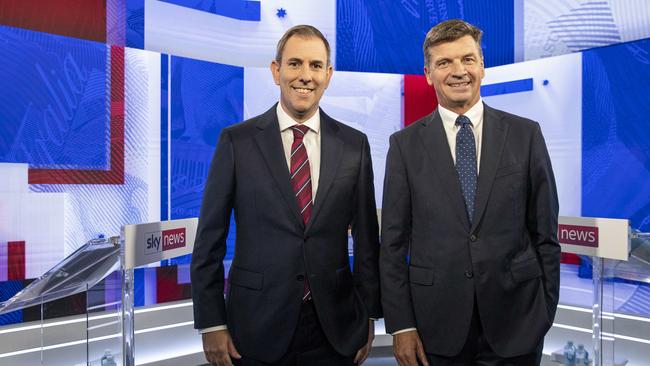
Yet the nation’s economic indulgences and complacency will soon expose our vulnerabilities. After what we’ve seen in the dismal set pieces and artificial happenings of the election campaign from the major party leaders, voters are left with policy dumb and policy dumber.
Who will lead the weighty contest of ideas to find a sustainable path through the fiscal challenges of ageing, trade disintegration and geopolitical fractures? Like it or not, it’s come down to the toil and temperament, courage and conviction of Jim Chalmers and Angus Taylor, the two men vying to steer the nation through the immediate tumult – and beyond.
The treasurers’ TV studio stoush the other night pitted a grumpy custodian, who supposedly has a glass jaw to criticism, against an aloof country squire who apparently shirks the hard work. Perhaps there’s some cold comfort in these revelations. It may prompt personal growth.
The Treasurer is a striver who obsesses over the job at hand; he sweats every performance review, wants to be liked and is cautious to a fault. On the evidence to date, the opposition Treasury spokesman has been coasting, so in a perverse way there’s plenty left in the tank to come up with sellable policies that will work.
Unfortunately, the Coalition’s new pitch about channelling 80 per cent of revenue windfalls into two new funds is not one of them. It’s an eye-catching gimmick that will neither please fiscal aficionados nor breathe new life into its economic credentials, which have taken a hit with purists and punters after voting against Labor’s tax cuts, puny as they are.
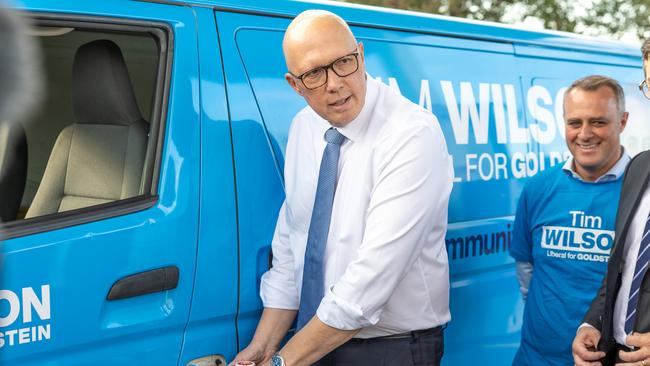
As well, Peter Dutton’s change of mind on public servants working from home was a spectacular reversal; ringside adjudicators gave him points for the move. But throwing in the towel revealed how little thought went into his signature policy (and there aren’t that many) as well as a lack of conviction. It’s almost the same as Kevin Rudd shelving Labor’s emission trading scheme in 2010 after Greens’ bastardry; that was a double failure, incompetency in governing and belief.
This election is no country for serious policy women and men. Yet the research shows voters will reward politicians who level with the electorate about the scale of our problems, offer solutions and argue for them. Otherwise, what is the purpose of seeking power? More of the same will not lift the pall of voters’ despond or the majors’ primary votes.
The pre-election economic and fiscal outlook, compiled by Treasury and Department of Finance, shows revenue rising to a record share of the economy, a decade of deficits and rising debt interest payments. Across five years (including the current one), underlying cash shortfalls are a cumulative $180bn. Gross debt hits $1 trillion in 2026.
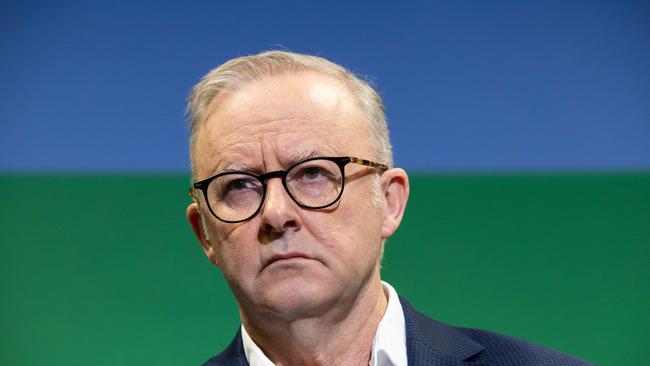
Chalmers rejects the budget rules previous governments (of both kinds) tried to adhere to and global bodies urge us to revive. They can take various forms – a tax cap, spending growth limits, debt targets – and impose discipline across the executive. And they are a proper scorecard to judge how a custodian is performing. Are they living up to honey-smooth boasts of responsible, methodical and restrained taxing and spending?
What do you get with Labor’s current game plan? Real spending growth of 6 per cent in 2025 (and fantasy estimates that across four years this falls below an annual average of 2 per cent). As a proportion of the economy, Canberra’s spending in 2026 will be at its highest level in 40 years (outside the Covid crisis).
Taylor claims the Coalition will restore the rules behind every “good budget from Peter Costello through to 2022”. It means a tax-to-GDP cap, ensuring outlays grow at a slower rate than the economy, and over a decade getting the budget’s resting heart rate back to balance. “Our tax-to-GDP cap is not just a fiscal rule,” Taylor told the National Press Club last week. “It is a lower taxes guarantee to the Australian people – ensuring we manage spending and create room for future tax cuts.”
There is no longer talk of averaging budget balance over the course of the cycle as in Costello’s original Charter of Budget Honesty in 1997 (let alone the former treasurer’s forlorn attempt in the face of a spendthrift John Winston to crank up the discipline to average a surplus over time).
The PEFO shows the heavy lifting of budget repair will be done through bracket creep, not by government action. Economic modeller Chris Murphy estimates the average personal income tax rate is now 24.3 per cent; it is set to rise to 28.1 per cent by 2036.
“This will be an all-time high average tax rate,” the Australian National University’s visiting fellow writes in The Conversation. “Living standards will be squeezed and incentives to work and save will diminish.”
Rather than the misleading announcements of tax cuts (simply handing back some of bracket creep), Murphy calls for automatically indexing the tax brackets to price growth in every budget. Across 11 years, indexation would see the average tax rate rise to 25.5 per cent. It would mean governments would have to be more transparent, efficient and fairer in how they fill the gap between spending and taxing.
“Possible ways include better priorities and higher efficiency in government spending, more reliance on indirect taxes such as the GST and expanding the tax base itself through reforms to boost productivity,” Murphy writes.
Neither side is offering tax reform of any kind, although there could be a push for it from the crossbench in a hung parliament.
Now, consider caps on international students, which Dutton and Taylor claim will restore the Australian dream of home ownership. No matter the starting point, the Coalition insists net overseas migration (which peaked 18 months ago at a mammoth 556,000) will be 100,000 less on their watch.
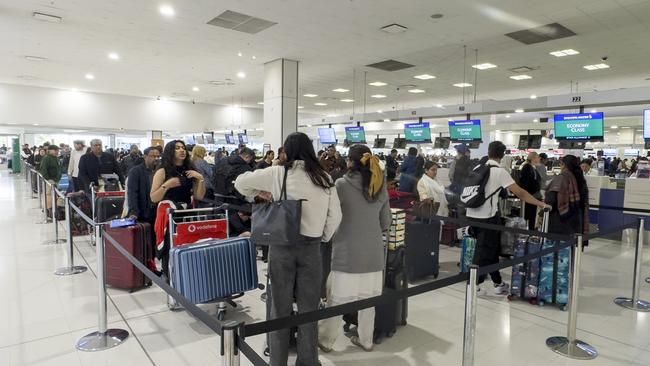
To achieve it, Dutton promises to undercut Anthony Albanese by 30,000 foreign commencements, to install a cap of around 25 per cent international students at public universities and tripling the student visa charge to $5000 for the Group of Eight universities ($2500 for other institutions). Labor raised the application fee from $710 to $1600 last year.
This is a reverse-Trump: putting a levy on exports. Canada’s use of this blunt object cost it dearly. In 2024, the Trudeau government put a two-year cap on study permits (an effective cut of 35 per cent; approvals actually fell by 45 per cent in 2024). The university lobby claims it will cost the economy billions of dollars
Dutton’s purported rationale for the caps is to improve housing supply and affordability; Labor’s motivation for student caps (which failed to pass the Senate in 2024) was to escape the toxic politics of migration and the charge the government was running a “Big Australia” policy.
Here’s the fallout: lower service export earnings when the dollar’s depreciation makes Australia a more attractive destination; damage to Brand Australia and the reputation of the country’s education sector; turmoil for universities. The gain? Dutton claims the move will “free up substantial additional housing each year, particularly in our major cities”.
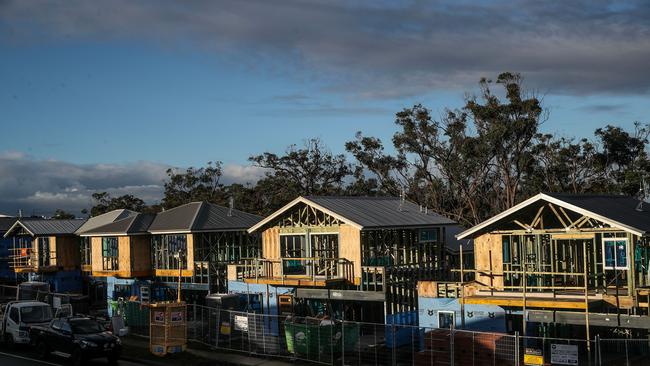
But foreign students aren’t in the same market as local first-home buyers. A longer-term perspective suggests population growth and housing move in tandem. The ANU’s Ben Phillips says lower migration won’t “free up housing” as per recent student cap policies. The associate professor at ANU’s Centre for Social Policy Research notes that as population rises dwelling numbers also increase. Since 1996, the number of dwellings has increased by 60 per cent in Australia, while population has grown by 50 per cent.
“With fewer migrants we’d also have fewer dwellings, which is to say population growth drives new construction and the number of dwellings,” he tells Inquirer. “If population growth stopped in 1996, would dwelling numbers have stopped growing or grown by 60 per cent as observed?
“It’s likely there would be some short-term ‘freeing up’ in housing from lower population growth but over the longer term it’s not what we observe. The recent population surge (and related housing issues) was temporary and Covid related. Future policy needs to reflect that reality.”
Amid the living-cost squeeze, the electorate is yearning for more than a cut-price auction on migration and spending sugar hits on fuel costs or home batteries to complement rooftop solar.
“Voters are saying it’s pretty tough to find any convincing news from the major parties on important issues of sensible economic management,” JWS Research’s business development manager Tom Cameron tells Inquirer.
The company’s research for the Susan McKinnon Foundation finds honesty and ethical behaviour are the No.1 traits voters want from leaders; the next two preferred qualities are having a plan for the future and respect for taxpayers’ money. “Too many in the electorate are just not showing any real sign of being persuaded that major party leaders are even attempting to genuinely prioritise, explain and deliver on either quality,” says Cameron.
JWS’s True Issues reveals 55 per cent of voters believe Canberra’s spending is likely to place pressure on future generations as they become taxpayers. After the 2024 federal budget, when public demand was putting pressure on inflation, keeping interest rates higher for longer, voters showed a clear policy preference: a lot more voters agreed (41 per cent) than disagreed (27 per cent) that surpluses should be used more to pay down debt, and less on spending to assist everyday Australians with cost-of-living pressures.
Cameron, a former adviser to federal Labor, says we need our politicians to be more curious about exploring where the general public may be more receptive to fiscally responsible policy options. “Cost of living is front of mind for most of the electorate but how we make the public maths of it all stack up is in the back of the mind of a hell of a lot of voters.”
The industry lobbies put on a united front in Parliament House on Thursday morning to call for more business-friendly workplace laws, fewer regulatory impediments and measures that encourage investment. They are pleading with Chalmers and Taylor to take the high policy road and back private enterprise. Maybe next time.
Instead, the risk-averse and vintage Albanese and Dutton caravans are rolling through to May 3 tooting a cacophony of scares, sledges, half-plausible wedges, populist jingles and junkyard ballads. Yet the rising anxiety of the past few years is now manifest in the choice before the electorate: more timidity and drift from a tired Labor or a return to an insipid Coalition whose policies are undercooked and oversold.







Donald Trump’s recklessness is testing the nimbleness of Australia’s policymakers. Who in authority can possibly follow the US President’s bouncing ball of a brain? Talk of a recession here is overblown and unhelpful, particularly given the monetary and fiscal firepower on hand.